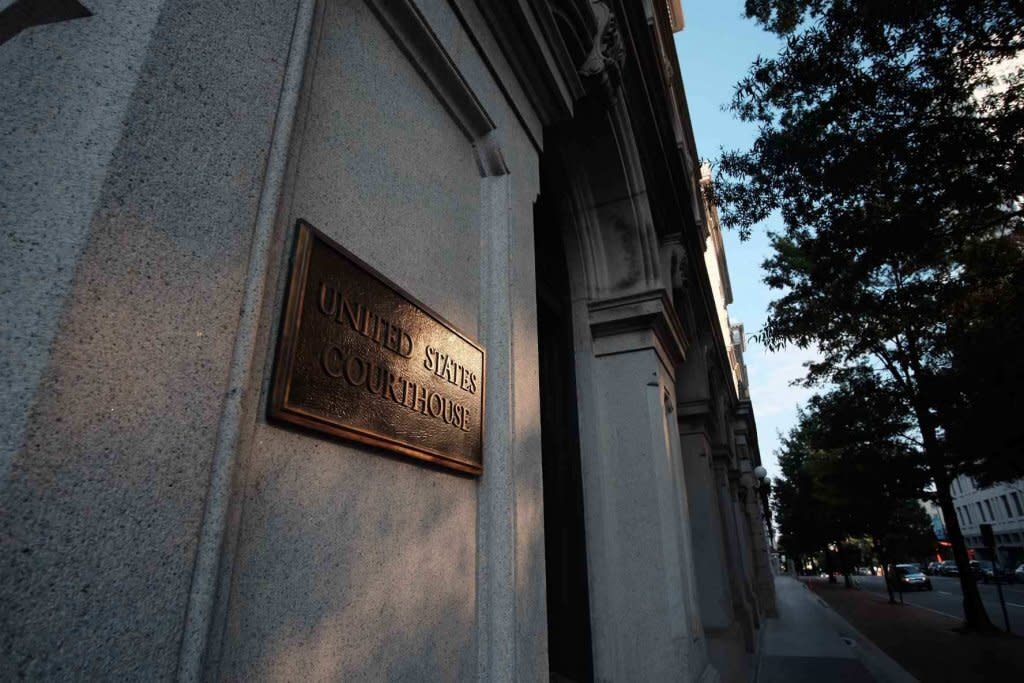Federal appeals court denies election groups’ expedited hearing request

The U.S. Court of Appeals for the Fourth Circuit in Richmond, Virginia. Photo by Ned Oliver/Virginia Mercury.
A federal appeals court has denied a request to expedite a hearing in a case involving the Maryland State Board of Elections and a group with ties to former Republican gubernatorial nominee Dan Cox.
Two groups – Maryland Election Integrity LLC and Missouri-based United Sovereign Americans — asked the 4th U.S. Circuit Court of Appeals in Richmond for an expedited hearing on July 16, just one week after appealing a district court judge’s rejection of their election security claims.
In a one-page order issued Thursday, the appeals court declined to fast-track the case. It gave no reason for denying the request.
It was the latest in a series of courtroom filings and arguments between the two groups and the elections board.
The case began in March when Maryland Election Integrity LLC and Missouri-based United Sovereign Americans sued the Maryland State Board of Elections in U.S. District Court for Maryland, alleging a number of violations of federal election law.
The group claimed that through “meticulous analysis” it found at least 79,392 voter registration violations that allegedly included duplicate registrations, “registrants with questionable inactive status,” and more than 40,000 with “instances of a questionable registration date.”
Their complaint also claimed that “voting system error rates are exponentially above the maximum allowable error rates. Inaccuracy and the specter of fraud have irretrievably damaged the reliability and credibility of results.” And the groups said the elections board denied their requests for election reports made under the Maryland Public Information Act.
The lawsuit asked U.S. District Court Judge Stephanie A. Gallagher to order the board not to certify the primary election results until the errors were corrected.
But Gallagher, in a May decision, dismissed the lawsuit without considering the allegations.
“Despite plaintiffs’ numerous assertions of problems with Maryland’s voting system, this court can begin and end its analysis with plaintiffs’ standing,” Gallagher wrote in her opinion.
Gallagher wrote that Missouri-based United Sovereign Americans did not “purport to represent any individual members” in Maryland.
She added that Maryland Election Integrity, which said it represented two registered Maryland voters — David Morsberger and Kate Sullivan — failed to identify any specific injury to either. Simply alleging that possible election irregularities may have diluted the votes of Morsberger and Sullivan is not enough, she wrote.
“Plaintiffs have not shown disadvantage to members of Maryland Election Integrity as individuals because the Amended Complaint lacks any information about whether Kate Sullivan or other members actually voted in any Maryland election, much less how Defendant’s actions helped defeat their supported candidates or causes,” Gallagher’s order said.
“In short, Plaintiffs allege no concrete or particularized injury to members of Maryland Election Integrity but simply generalized grievances applicable to the community as a whole. Courts routinely find such grievances insufficient to demonstrate standing to sue,” she wrote.
In their appeal to the 4th Circuit, attorney C. Edward Hartman III wrote that the district court “erred and abused its discretion in finding Appellants failed to establish Plaintiffs were active Maryland voters.” He wrote that Gallagher used the wrong legal standard in determining how Morsberger and Sullivan had been affected by the allegations.
“Kate Sullivan and David Morsberger are aggrieved when eligible voters are listed on Maryland voter rolls and the registration system is, generally, corrupted on account of Appellee’s failure to take action to properly purge Maryland’s voter rolls thus diluting Appellants’ votes,” said Hartman, who added that his clients documented problems with the voting rolls that the board did not act on.
Hartman, an Annapolis-based attorney, previously represented Dan Cox, then the Republican nominee for governor, in a failed 2022 bid to block the early counting of mail-in ballots that year.

